RTAC Celebrates International Women’s Day
POSTED March 8, 2021
|Gender Equality and Women’s Empowerment
By Nigel Gibbs, RTAC Communications Manager
In recognition of International Women’s Day, the Research Technical Assistance Center (RTAC) is highlighting some of our network’s women researchers. The United Nations called on people to use the March 8 commemoration as a, “time to reflect on progress made, to call for change and to celebrate acts of courage and determination by ordinary women, who have played an extraordinary role in the history of their countries and communities.” At RTAC, we are committed to creating opportunities for women researchers working in international development. We seek to provide a space where women can make an impact by leveraging the scientific expertise of academic researchers to make evidence-based decisions. We have chosen to spotlight a few of our 350-women research academics, their accomplishments, extensive knowledge, and unique experiences which make them experts in their field.
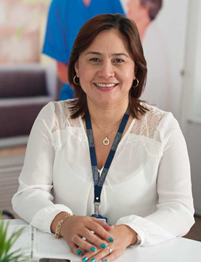
Dedsy Berbesi-Fernandez, Ph.D. is the Dean of Nursing at CES University in Medellin, Colombia and a researcher focusing on the epidemiology of drug use, social networks, and HIV/HCV prevention. Her research in HIV helps generate a better understanding and monitoring of gender differences in Colombia’s vulnerable populations. Dr. Fernandez’s research findings inform future research, addressing the complex way socioeconomic, cultural, and political variables impact gender differences in the public health response to HIV.
“The combination has allowed us to accomplish some impressive research, but there is still so much to do around interventions that can be applied in Colombia’s vulnerable populations.”Dr. Fernandez Ph.D.
Much of Dr. Fernandez’s research has been focused on Colombia’s marginalized communities, i.e., intravenous drug users, LGBTQ persons, the homeless, and the incarcerated, among others. Her work is challenging, especially as it relates to earning the trust of these marginalized groups. Financial limitations and a lack of ideal support can make HIV public health management even more difficult. Nonetheless, Dr. Fernandez remains dedicated to her work and is unphased by the obstacles she faces. Her research is critical in guiding public health policy as she understands the complicated social factors surrounding HIV risk behaviors.
Dr. Fernandez has faced challenges as a woman and a nurse. She has found that some people do not associate the nursing profession with research and only view nurses as supporting roles. She recalls a time when a scientific journal did not accept her research because they believed she was not an expert. Nonetheless, Dr. Fernandez knows her extensive experience, education and hard work has allowed her to make an impactful career in research and to eliminate gender barriers. She is grateful for the support of CES University, its funders, and her dedicated research and fieldwork team. “The combination has allowed us to accomplish some impressive research, but there is still so much to do around interventions that can be applied in Colombia’s vulnerable populations.”
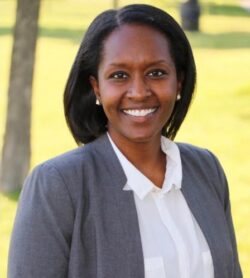
Meseret F. Hailu, Ph.D. is an Assistant Professor of Higher and Postsecondary Education in the Mary Lou Fulton Teachers College at Arizona State University (ASU). Prior to coming to ASU, Dr. Hailu was a Fulbright Fellow conducting research in Ethiopia and was a Postdoctoral Research Associate at The Ohio State University, where she studied the experiences of women of color faculty in engineering departments. Her areas of expertise include STEM, gender, higher education, women, and African education; she focuses on the retention of minoritized women in STEM pathways and professions.
“Many people in my field—but especially my mentors from my graduate education and postdoctoral appointment—have helped pave a path for me so I can advance as an academic researcher. I am grateful that these people continue to advocate for me, and I am committed to doing the same for other women.”Dr. Hailu Ph.D.
Dr. Hailu’s research sheds light on ways to increase educational and professional opportunities in STEM for historically underserved populations. Her career has led her to work in higher education systems in the United States, and countries in Eastern Africa, including Ethiopia, Kenya, Rwanda, and Uganda.
Dr. Hailu hopes education researchers, policy makers, and higher education administrators will use her work to design higher education policy and practices that broaden participation for historically underserved populations.
As a professional woman in her field, Dr. Hailu has had her share of challenges including limited professional networks for women in STEM. “Many people in my field—but especially my mentors from my graduate education and postdoctoral appointment—have helped pave a path for me so I can advance as an academic researcher. I am grateful that these people continue to advocate for me, and I am committed to doing the same for other women.”
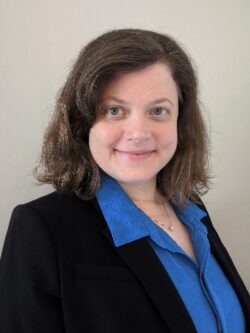
Rowenn Beth Kalman, Ph.D., is an Assistant Professor of Anthropology at Michigan State University and a scholar of environmental politics, focusing on the impacts of governance strategies, social movements, and development programs in Latin America. Her recent research examined the dynamics shaping participation in conservation initiatives in the Andes. Dr. Kalman identified the challenges of women’s inclusion in community-based water stewardship, showing how indigenous women’s limited access to training, language barriers and livelihood responsibilities impeded their participation with NGOs. By focusing on gender ideologies and institutional practices, Dr. Kalman’s research “illuminates how strategies and structural conditions interrelate and produce unintended outcomes.”
The Michigan State professor’s use of ethnographic, participatory, and mixed methods to capture the situated experiences of those affected by environmental change has proven effective. Her work in the Andes led to a collaborative workshop with community leaders to address the challenges they faced in forestry management. To increase the audience and potential users of her research, she presents findings directly to collaborators and program implementors and shares them with a broader, non-academic public. Her strategies include printing and distributing pamphlets to indigenous communities, presenting for NGO audiences, and using regional publications.
Dr. Kalman is a feminist and a scholar, who was “fortunate to have strong mentors who exemplified feminist research and leadership” throughout her M.A. and Ph.D. programs. She continues to be inspired by scholars working to highlight women’s experiences, overturn interconnected systems of oppression, and change the politics of representation and research engagement.
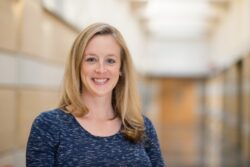
Laura Miller-Graff, Ph.D. is an Associate Professor of Psychology and Peace Studies at the University of Notre Dame. Her areas of expertise include psychological trauma, program evaluation, child development, and intimate partner violence. Her work focuses primarily on individuals who have multiple traumatic exposures to violence and the challenges they face.
One of Dr. Miller-Graff’s primary areas of research is intimate partner violence (IPV) and the evaluation of programs that reduce IPV and its adverse effects on children and families. Intimate partner violence is the most prevalent form of gender-based violence and has significant intergenerational consequences. Women who experience IPV are at risk of heightened depression and posttraumatic stress, which have long-term implications for parenting and child development.
“We seek to make this engagement iterative throughout the course of our work and aim to maintain a close working relationship with our implementing partners and service users.”Dr. Miller-Graff Ph.D.
Dr. Miller-Graff’s team uses a community-based participatory approach to their research. Violence affects women and children globally, but the development of contextually and culturally relevant and effective supports requires a commitment to sustained engagement with those that embrace the integration of empirical research and community perspectives seriously. “We seek to make this engagement iterative throughout the course of our work and aim to maintain a close working relationship with our implementing partners and service users.” By doing this, they can better understand their experience, integrate their feedback to improve the program content and implementation and make it more effective and sustainable.
Dr. Miller-Graff credits the support of friends, family, and mentors as being a major factor in her success. She spent her formative years in the empowering space of an all-girls high school “where women were encouraged to be bold, intellectually curious, and were supported in the pursuit of their goals. My educational formation both there and at the University of Notre Dame demanded for learning to becom[e] service to justice.” Dr. Miller-Graff hopes by “advancing rigorous, scientific research on programs that address violence and intergenerational risk and resilience, and by reflexively considering our learnings across contexts, we can find ways to support women around the world who are already hard at work in building a better future for their families.”
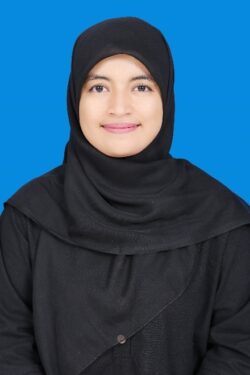
Ms. Nurbaya, M. Sc., is a lecturer of nutrition at Indonesia’s Mamuju Health Polytechnic. Her research focuses on food and nutrition security among Indonesia’s indigenous communities and is funded by the Neys-van Hoogstraten Foundation. Her familiarity with their unique culture, food, and health system, and how women participate in decision making, makes her effective in empowering, encouraging and supporting women’s’ roles in their community. Their trust in her allows Ms. Nurbaya to work with indigenous women and learn about their families’ food access and health services utilization, as well as their traditional health system.
“We must work hand in hand to continue to voice our aspirations and voices at all levels, in everyday life, in the work environment, and even at the level of the traditional community.”Ms. Nurbaya M. Sc
Ms. Nurbaya’s research helps raise awareness of the negative impacts of feeding prelacteal food to infants. She has worked with village midwives to train mothers in optimal feeding practices for infants and children under five utilizing local food. Indigenous women’s trust in her, permitted her to share their desires to participate in farming with local leaders.
As a woman, Ms. Nurbaya faced numerous challenges throughout her professional career. Often, she feels her opinions or ideas are dismissed and not considered in the decision-making process. She is nonetheless grateful to be surrounded by friends with whom she can share her ideas and research supervisors who also believe that women’s voices should be heard. Nurbaya believes, “We must work hand in hand to continue to voice our aspirations and voices at all levels, in everyday life, in the work environment, and even at the level of the traditional community.”
